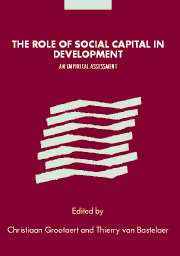Book contents
- Frontmatter
- Contents
- List of figures and maps
- List of tables
- List of boxes
- Notes on contributors
- Acknowledgments
- Foreword by Robert D. Putnam
- Introduction and overview
- Part 1 Social capital at the micro and macro levels: a conceptual discussion and review
- Part 2 The impact of social capital on development
- 3 Mapping and measuring social capital through assessment of collective action to conserve and develop watersheds in Rajasthan, India
- 4 Social capital and the firm: evidence from agricultural traders in Madagascar
- 5 How do participation and social capital affect community-based water projects? Evidence from Central Java, Indonesia
- 6 Does social capital increase participation in voluntary solid waste management? Evidence from Dhaka, Bangladesh
- Part 3 The creation and transformation of social capital
- Conclusion: measuring impact and drawing policy implications
- Index
- References
5 - How do participation and social capital affect community-based water projects? Evidence from Central Java, Indonesia
Published online by Cambridge University Press: 22 September 2009
- Frontmatter
- Contents
- List of figures and maps
- List of tables
- List of boxes
- Notes on contributors
- Acknowledgments
- Foreword by Robert D. Putnam
- Introduction and overview
- Part 1 Social capital at the micro and macro levels: a conceptual discussion and review
- Part 2 The impact of social capital on development
- 3 Mapping and measuring social capital through assessment of collective action to conserve and develop watersheds in Rajasthan, India
- 4 Social capital and the firm: evidence from agricultural traders in Madagascar
- 5 How do participation and social capital affect community-based water projects? Evidence from Central Java, Indonesia
- 6 Does social capital increase participation in voluntary solid waste management? Evidence from Dhaka, Bangladesh
- Part 3 The creation and transformation of social capital
- Conclusion: measuring impact and drawing policy implications
- Index
- References
Summary
Most rural villages in the Indonesian province of Central Java lack regular access to clean drinking water, and many face severe water shortages, particularly during the dry season. The lack of clean water increases rates of sickness and death and reduces the time and resources available for productive activity, thereby diminishing well-being. Household incomes in these villages are low, and access to other types of infrastructure, such as roads, is limited. More than half of rural villages in Central Java are classified as poor, based on infrastructure, housing, and environmental and population characteristics (World Bank 1995).
To improve access to safe drinking water in Central Java, several governmental and nongovernmental organizations (NGOs) initiated rural water projects in the late 1980s and early 1990s. The government of Indonesia implemented two projects that were partially financed by the World Bank, the Water Supply and Sanitation Project for Low Income Communities (WSSLIC) and the Village Infrastructure Project (VIP). WSSLIC serves about 2,000 villages in five Indonesian provinces (Central Java, Southeast Sulawesi, North Sulawesi, Maluku, and Nusa Tenggara Timur). VIP consists of two separate projects, Village Infrastructure Project for Java (VIP I) and its extension, Second Village Infrastructure Project (VIP II). VIP I serves 1,200 villages in Java; VIP II serves 2,600 villages in Java and Sumatra.
The objectives of WSSLIC are to provide safe, adequate, and easily accessible water supply and to support hygiene education through community-based arrangements.
- Type
- Chapter
- Information
- The Role of Social Capital in DevelopmentAn Empirical Assessment, pp. 155 - 187Publisher: Cambridge University PressPrint publication year: 2002
References
- 16
- Cited by



